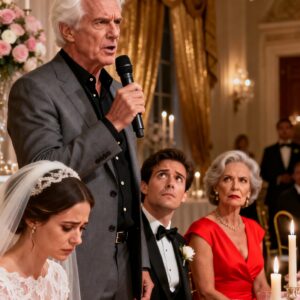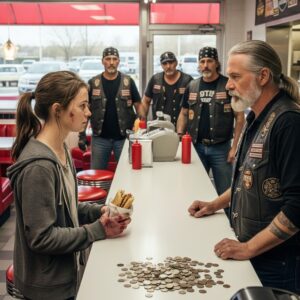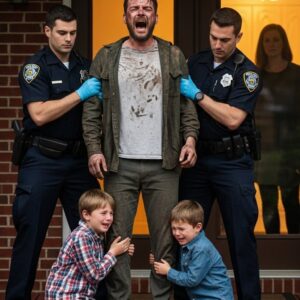The emergency room was chaos that night.
Sirens echoed through the sliding doors like ghosts of decisions that had come too late. Gurneys rattled, shoes squeaked, and the air smelled of antiseptic, adrenaline, and fear.
It was a Tuesday, the kind of night that never ended — the kind that felt stitched together by fluorescent light and exhaustion.
Dr. Ethan Ross moved through it like water, sleeves rolled, stethoscope swinging. He was thirty-two, one of the youngest attending physicians at St. Margaret’s Medical Center in downtown Dallas — sharp, quiet, precise.
He’d seen every kind of chaos before: car crashes, overdoses, broken hearts with EKGs to match. But that night, something different came through the sliding doors.
It started with a sound — not the ambulance siren, but the dragging shuffle of old boots across wet tile.
An elderly man stood in the entrance, clothes torn, beard wild and streaked with gray. One arm was wrapped in a dirty jacket, blood soaking through the sleeve.
The triage nurse hesitated. Two others stepped back.
He smelled of rain, gasoline, and the streets — that unmistakable scent of survival mixed with hunger.
“Sir?” the nurse asked cautiously. “You need to sit down.”
The man didn’t move. His eyes — a sharp blue dulled by years of silence — darted around the room.
Ethan didn’t hesitate.
“Get me saline,” he said, already moving forward. “And gloves.”
The nurses looked at him. “Dr. Ross—”
“Now,” he said, voice low, steady.
Something in his tone made everyone move.
The old man flinched when Ethan reached him, as though expecting to be pushed away.
“Easy,” Ethan murmured. “I’ve got you.”
He guided him onto a cot, unwrapped the jacket. A deep gash ran from wrist to elbow — infected, angry, days old.
As Ethan cleaned the wound, he noticed a tattoo faded across the man’s wrist.
It read: “For those I couldn’t save.”
The words hit harder than the smell of antiseptic.
“Name?” Ethan asked gently.
The man hesitated. “Walter. Walter Briggs.”
“Alright, Walter. You’re safe here.”
Walter gave a tired half-smile. “Safe’s a funny word, Doc.”
When the wound was cleaned, Ethan noticed a crumpled photograph in Walter’s jacket pocket.
He unfolded it carefully. A young soldier in uniform stood with his arm around two comrades, all of them grinning into a sun that no longer existed.
“Marines?” Ethan asked softly.
Walter nodded. “A long time ago.”
The nurses exchanged glances. One whispered something about “no ID, no insurance.”
Ethan ignored it. “Get him a warm blanket.”
The head nurse hesitated. “Doctor, policy says—”
Ethan cut her off. “He’s bleeding, not billing.”
By 2 a.m., the ER had quieted.
Walter slept, arm bandaged, color returning faintly to his face.
Ethan sat beside the bed, sipping lukewarm coffee. The monitors hummed softly.
When Walter stirred, he opened one eye and croaked, “Why’d you help me?”
Ethan smiled faintly. “Because someone once helped me.”
Walter studied him for a long moment. Then nodded, as if they’d just agreed on something ancient and unspoken.
By morning, the storm outside had broken. Sunlight spilled through the blinds, cutting across the room in thin lines.
That’s when Ms. Greer walked in.
She was the hospital administrator — tall, silver hair pulled back tight enough to seem painful, clipboard clutched like a weapon.
“Dr. Ross,” she said, her voice crisp. “A word.”
He followed her into the hall.
“You spent half the night on a… transient,” she said carefully, as if the word itself might stain her tongue.
“He was bleeding,” Ethan replied.
“He’s not a patient. He’s a liability. No ID. No insurance. The board has made it very clear—”
“He’s a veteran,” Ethan said, cutting her off. “And I’ll handle the cost.”
Ms. Greer’s eyes narrowed. “That’s not how this works.”
Ethan’s jaw tightened. “Then maybe it should be.”
At noon, they handed Walter discharge papers.
He sat quietly on the edge of the bed, staring at the floor like a man watching the dust settle over his life.
“I fought for people I never met,” he muttered. “And now I can’t even afford a bed.”
Ethan stood in the doorway, watching him.
Something in that sentence cracked open the part of Ethan that medicine had tried to numb.
He made a call to a friend who ran a shelter nearby — arranged a room, paid for the medication himself.
When he came back, Walter looked up, confused.
“Doc, you don’t owe me this.”
“I know,” Ethan said softly. “But maybe I owe it to someone like you.”
Walter’s eyes glistened. “I ain’t prayed in years,” he said. “But I think I will tonight.”
That night, Ethan was still on shift when Dr. Henry Wallace, the hospital’s head surgeon, walked into the ER.
He was older — silver hair, limp in his left leg, the kind of man whose presence made rooms stand still.
“Ross,” he said, “who’s this Walter Briggs everyone’s talking about?”
Ethan explained quietly — the wound, the tattoo, the shelter.
Wallace’s face changed. The color drained out of it.
He whispered, “Walter Briggs saved my platoon in Afghanistan.”
Ethan froze. “What?”
The older man nodded slowly, eyes glassy. “He carried me through enemy fire after the blast. I thought he died years ago.”
He pointed to a scar above his temple. “He gave me this. I gave him my word I’d never forget him. And I did.”
By morning, word spread through the hospital.
Doctors, nurses, even patients gathered near Walter’s room.
They didn’t see a homeless man anymore.
They saw a soldier.
A ghost from someone’s war returned to life.
When Ms. Greer entered again, she stopped cold.
Every staff member in the unit stood between her and the bed — not defiant, just firm.
Ethan stepped forward. His tone calm, but final.
“We take care of our heroes,” he said.
For a long time, she said nothing. Then she looked around the room, at the faces watching her, and sighed.
“Fine,” she said quietly. “He stays.”
Days passed.
Walter’s color returned. His humor came back. He told stories — some real, some probably not — about deserts and brothers and things too heavy to name.
He started helping in small ways: delivering coffee to nurses, cheering up patients in physical therapy.
And slowly, his presence changed the rhythm of the ward.
Where there had been exhaustion, there was laughter.
Where there had been policy, there was heart.
On the last day before his discharge, Walter asked to see Ethan one last time.
He reached into his jacket — clean now, freshly laundered — and pulled out that old photograph.
The one of him and his unit.
He handed it to Ethan.
“I carried this through war,” he said quietly. “Through streets, through cold nights. You reminded me why I fought. For people who still care.”
Ethan looked down, blinking fast. “You should keep it.”
Walter smiled faintly. “Heroes need reminders too.”
When Walter left, the staff lined the hallway.
Some saluted.
Some simply bowed their heads.
No one said goodbye.
They just watched as the automatic doors opened and sunlight poured over him like a blessing.
Part Two:
For a few weeks after Walter left, the ER felt different.
The same alarms went off, the same stretchers rolled through the sliding doors, but something invisible had shifted. People slowed down when they passed the waiting area where Walter used to sit, and more than one nurse started keeping spare socks or protein bars in her locker “just in case.”
Dr. Ethan Ross kept Walter’s photo on his desk, tucked between lab results and patient charts. When residents asked why, he’d only say, “Reminds me not to look away.”
A month later, the envelope arrived.
No return address, just Department of Veterans Affairs in the corner and handwriting shaky but determined.
Inside was a single sheet of lined paper.
Doc,
I’m home now. Not the house kind — the kind that lives in people’s hearts. I’m staying at a center for vets. They’re helping me get back on my feet. Thought you should know the medicine worked and so did the kindness.
Tell the nurses thanks for the coffee. Tell that administrator lady not to worry — I paid my bill in stories.
Semper Fi.
— Walter Briggs.
Folded inside the letter was a small, polished Marine Corps medal.
Ethan turned it over in his hand until the engraving caught the light: For valor beyond duty.
He set it in a glass display case near the ER waiting room with a small brass plaque that read:
“Compassion heals what medicine cannot.”
The letter spread through the hospital faster than any memo ever had.
Within days, every department had printed copies pinned to bulletin boards. The story reached local news — Homeless Veteran Finds Hope at St. Margaret’s.
Cameras showed up, reporters wanting interviews.
Ms. Greer, the administrator who had once called Walter a liability, now stood in front of microphones praising “community-centered care.”
Ethan avoided the spotlight, staying in the background while the hospital soaked in the good publicity. He didn’t care about the press. He cared about the nurses smiling again, about the interns who suddenly started volunteering at shelters on weekends.
But he could feel a storm brewing behind the glow.
Two weeks after the story aired, he was called to the conference room on the top floor.
The board sat around a long oak table — suits, ties, and coffee cups that cost more than a nurse’s hourly wage.
Ms. Greer was there, her smile tight.
“Dr. Ross,” the chairman said, “your compassion has brought excellent attention to St. Margaret’s. Donations are up fifteen percent.”
“Glad to hear it,” Ethan said cautiously.
“However,” the man continued, “the board is concerned about precedent. You paid out of pocket for a patient. That’s against policy. We can’t have physicians independently funding care. It creates… liability.”
“So kindness is a liability now?”
The room went silent. A few members shifted uncomfortably.
Ms. Greer spoke next, her tone clipped. “We’re not questioning your intentions, Doctor. But this hospital runs on procedure. Emotion can’t override protocol.”
Ethan leaned forward, voice calm but steady. “Protocol didn’t save Walter Briggs. People did.”
The chairman cleared his throat. “Be that as it may, we expect full adherence to administrative policy moving forward. No exceptions.”
He stood. Meeting over.
That night, Ethan walked the ER floor long after his shift ended.
The lights flickered low; monitors beeped in a slow rhythm.
He stopped by the display case — the medal catching the dim light — and wondered what Walter would say.
Probably something simple. Don’t quit, Doc. The fight’s never over.
Two months passed.
Then another storm rolled in — literal this time. Freezing rain hammered the city, and by midnight, the ER overflowed with hypothermia cases and frostbite victims pulled from underpasses and alleys.
One of the nurses rushed over. “We’re out of blankets, Doctor.”
Ethan looked around. The supply room was empty. Funding cuts had hit again.
He stripped off his own jacket and wrapped it around the nearest patient — a young woman shivering so hard her teeth clattered.
When Ms. Greer came down to survey the chaos, she stopped short at the sight of him kneeling beside her.
“You can’t use personal clothing as medical equipment,” she snapped.
Ethan looked up. “Would you rather I watch her freeze?”
Their eyes locked. For the first time, hers flickered — not anger, but something else.
Maybe recognition. Maybe shame.
She turned sharply. “I’ll authorize an emergency order for supplies,” she said. “Do what you need to, Dr. Ross.”
By dawn, the ER was quiet again. The storm had broken, leaving the city silver and still.
The young woman woke, warm under a pile of fresh blankets.
“Did I make it?” she whispered.
“You did,” Ethan said.
She smiled weakly. “Thanks, Doc. Someone told me hospitals don’t help people like me anymore.”
Ethan glanced at the medal behind the glass, then back to her.
“Someone lied,” he said.
That morning, Ms. Greer found him in the staff lounge.
“I read the letter again,” she said, holding Walter’s note. “I think I finally get it.”
Ethan raised an eyebrow.
“It isn’t about the rules,” she said quietly. “It’s about who we are when no one’s watching.”
He smiled. “That’s all I’ve been saying.”
She sighed. “I still have to file the paperwork.”
“Of course,” he said. “But you did the right thing last night.”
“Don’t make a habit of telling me that,” she said, but her voice softened before she walked out.
A week later, a new plaque appeared beside Walter’s medal.
It read:
ST. MARGARET’S CARES PROGRAM — Founded in Honor of Walter Briggs
Providing medical aid to homeless veterans and those in need, regardless of insurance or status.
Ethan hadn’t proposed it. Ms. Greer had.
When he saw it, he laughed under his breath. “You win, Walter,” he murmured. “You started a revolution.”
That evening, as he left the hospital, rain began to fall again — softer this time, cleansing instead of cold.
He pulled his collar up and walked toward the parking lot, passing a man sitting under the awning, soaked but smiling.
“Doc,” the man called out. “You work here?”
“Yeah,” Ethan said, stopping.
The man pointed to the plaque through the glass. “That vet they’re talking about — he used to bunk near me at the shelter. Said some doctor saved him.”
Ethan smiled faintly. “Sounds like a good man.”
The stranger grinned. “He was. Said to tell you if you ever see a lost soul in the rain, don’t walk past.”
Ethan nodded. “I won’t.”
He handed the man his umbrella and kept walking.
Behind him, the stranger called out, “Hey, Doc — you just did it again.”
Ethan turned, rain sliding down his face, and for the first time in years, he laughed.
Because sometimes the biggest shock isn’t what happens to a hospital —
it’s what happens inside the people who work there.
Part Three:
It was spring when the past walked back through St. Margaret’s sliding glass doors.
Rain streaked the windows, soft and steady, the kind that made the city smell clean again.
Dr. Ethan Ross was on a double shift, running on caffeine and habit, when the paramedics rolled in a new patient — a young man, maybe mid-twenties, shivering, clothes soaked, pulse weak.
“Found him near the bus depot,” one EMT said. “Possible hypothermia. Said he’s a vet.”
The words made Ethan glance up sharply.
The young man’s dog tags clinked against his chest — name barely visible: Briggs, A. J.
Ethan froze. “Briggs?”
The EMT nodded. “Said something about his father. Walter Briggs. Ring any bells?”
Ethan’s breath caught.
Yeah.
It rang every bell in his chest.
He worked fast — IV fluids, warming blankets, vitals.
The young man’s lips were pale, cracked from cold. His fingers twitched as he murmured something between sleep and delirium.
“Dad… said… hospital… good people…”
Ethan leaned closer. “You’re safe, okay? You’re at St. Margaret’s. I’m Dr. Ross.”
The man’s eyes fluttered open for a second — same sharp blue as his father’s.
“Ross,” he whispered. “My dad talked about you. Said you… saved him.”
Ethan smiled faintly. “He saved me, too.”
When A.J. woke hours later, he was stable but silent, staring at the ceiling.
Ethan sat beside his bed, clipboard in hand. “So, you’re Walter’s son.”
A small smile tugged at A.J.’s lips. “He never stopped talking about you. Said you gave him a second life.”
“He gave me something better,” Ethan said. “Perspective.”
A.J. nodded slowly. “He died last year. VA hospital in Virginia. Peacefully, they said. I was deployed. Didn’t make it back in time.”
“I’m sorry,” Ethan said quietly.
A.J. looked away. “He told me to come here if I ever got lost. Said this was where people still see you — not just your record.”
When Ms. Greer heard about the new patient, she stopped by.
Her posture was still straight, her tone still clipped, but her eyes softened when she saw A.J.
“You’re Walter’s boy?” she asked.
“Yes, ma’am,” A.J. said.
She smiled faintly. “Your father changed this hospital. You probably don’t know that.”
He shrugged. “He used to say kindness is contagious if someone’s brave enough to start it.”
Ms. Greer laughed softly. “That sounds like him.”
Over the next few days, the staff treated A.J. like family.
Nurses brought him home-cooked meals, the same ones they used to sneak to Walter.
A.J. helped other patients in rehab — taught one man how to use his crutches properly, calmed a kid crying after surgery.
When Ethan asked why he kept helping, A.J. said, “It’s what Dad would do. He always said hospitals need hearts, not just hands.”
Ethan nodded. “He was right.”
One afternoon, A.J. asked to see the display case.
Ethan wheeled him down the hall. The medal gleamed in the glass, light catching the inscription: For valor beyond duty.
Under it, the plaque Ms. Greer had added months before: “Compassion heals what medicine cannot.”
A.J. stared at it for a long time, jaw tight, eyes wet.
“I thought this got lost after the war,” he said.
“He sent it to us,” Ethan said. “Said heroes need reminders too.”
A.J. smiled through tears. “He’d say that. He never liked being called one, though.”
Ethan folded his arms. “Neither do you, I bet.”
“Guess it runs in the family.”
When A.J. was finally discharged, he asked if he could volunteer at the hospital’s veterans program.
“I’m not a doctor,” he said, “but I can listen. Sometimes that’s all people need.”
Ethan nodded. “You’d make your father proud.”
A.J. grinned. “That’s the plan.”
Three months later, the St. Margaret’s Cares Program expanded again — this time adding a counseling and job-placement center for homeless vets, funded entirely by private donors who’d read Walter’s story online.
The ribbon-cutting was small. No cameras this time, no reporters. Just staff, patients, and one empty chair with a folded jacket draped over it — Walter’s old Marine coat, cleaned and preserved.
Ethan stood next to A.J. as Ms. Greer gave her speech.
“This hospital used to measure success in numbers,” she said. “Now, we measure it in names — the ones we remember, the ones who remind us why we’re here.”
She turned toward Ethan. “Dr. Ross taught us that one act of compassion can change everything. Walter Briggs proved it.”
Ethan shook his head. “Walter taught it. I just listened.”
That night, after the crowd left, Ethan sat alone in the ER lobby.
He watched the reflection of the medal in the glass and thought of the way Walter had looked the last time he’d seen him — standing in sunlight, head high, free.
The sliding doors opened, and a gust of warm air swept through the room.
A.J. walked in, still in his volunteer vest, carrying two cups of coffee.
“Couldn’t sleep?” he asked.
Ethan smiled. “Doctors don’t sleep. We recharge occasionally.”
A.J. handed him a cup. “Dad said you were like that. He told me once you reminded him of someone from the service.”
“Who?”
“Himself.”
Ethan chuckled. “That’s generous.”
“No,” A.J. said softly. “It’s true. He said you both fought different kinds of wars — one with bullets, one with bureaucracy — but both for people who couldn’t fight for themselves.”
Ethan looked out at the city lights. “Then I guess I’ll keep fighting.”
A.J. nodded. “Me too.”
A few weeks later, the hospital got another letter.
No address this time, just a return stamp from the VA center in Virginia.
Inside was a short note written in neat, careful script:
Dr. Ross,
I met a man named A.J. Briggs today. Says you saved his dad and him too. He’s helping run our veteran outreach now. You should see him — he’s good at it.
Funny thing, how kindness spreads faster than rumor. Keep at it.— Lt. Henry Wallace (Ret.)
Ethan smiled when he read the signature.
Dr. Wallace — the old head surgeon — had retired and moved east.
The letter felt like a circle closing.
He pinned it to the wall beside Walter’s photo.
A year later, St. Margaret’s held its first “Walter Briggs Day.”
Veterans came from all over — men and women with medals, scars, and stories.
Ethan stood by the entrance, shaking hands, listening, learning.
And when one of them asked him why a civilian doctor had gone through so much trouble for a man he barely knew, Ethan said simply,
“Because someone once reminded me that being human is the first part of medicine.”
The veteran nodded. “Hell of a lesson, Doc.”
Ethan smiled. “The best I ever learned.”
That night, as the lights dimmed and the hospital quieted, Ethan walked the corridors one last time.
He stopped at the display case, staring at the medal, the plaque, and the reflection of his own tired face.
Behind him, the cleaning crew moved quietly. The world went on.
He whispered, “Thanks, Walter,” and turned off the lights.
Outside, the city hummed — sirens, laughter, the pulse of a thousand small stories still unfolding.
And somewhere, in the rain-slick streets beyond the hospital walls, another lost soul was finding their way home — because one man, years ago, had reminded another that compassion was contagious.
THE END





